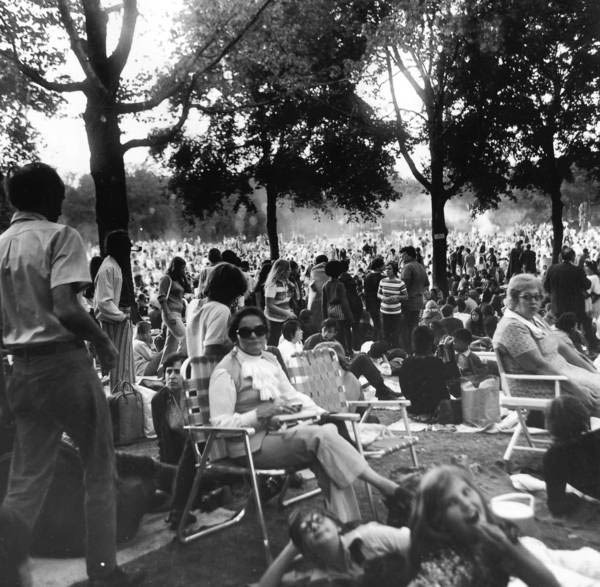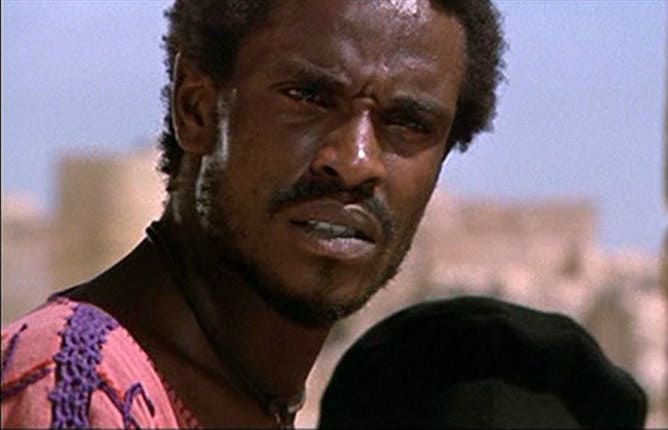
By Andrew Chukerman
 Ravinia favorite John Legend wowed audiences in NBC’s Easter-night, live concert production of the Tim Rice/Andrew Lloyd Webber rock opera Jesus Christ Superstar. Ravinia famously presented the groundbreaking musical on August 6 and 7, 1971, (read the Chicago Tribune story) to what were then record-breaking audiences. One fan remembers the event.
Ravinia favorite John Legend wowed audiences in NBC’s Easter-night, live concert production of the Tim Rice/Andrew Lloyd Webber rock opera Jesus Christ Superstar. Ravinia famously presented the groundbreaking musical on August 6 and 7, 1971, (read the Chicago Tribune story) to what were then record-breaking audiences. One fan remembers the event.
 The 1971 Ravinia crowd for Jesus Christ Superstar (Photo: John Bartley, Chicago Tribune) [click to enlarge]My mother has some vivid memories of seeing Jesus Christ Superstar at Ravinia in 1971. That was the Vietnam War era, complete with long-haired hippies, Thomas Leary, and emotions still raw and charged on the heels of the Democratic Convention and the Weather Underground’s “Days of Rage” riots. To the seasoned Ravinia-goer, the lawn looked as if it was covered with “flower children” instead of the usual suburban crowd. “We really knew very little about the show before we went to see it, only that it was a very different and unique kind of musical—a ‘rock opera.’ We went with another couple who were not at all familiar with this type of music. They loved Ravinia for its symphony concerts and distinguished guest artists. They were astonished—and even shocked, I think—by what they saw and heard.”
The 1971 Ravinia crowd for Jesus Christ Superstar (Photo: John Bartley, Chicago Tribune) [click to enlarge]My mother has some vivid memories of seeing Jesus Christ Superstar at Ravinia in 1971. That was the Vietnam War era, complete with long-haired hippies, Thomas Leary, and emotions still raw and charged on the heels of the Democratic Convention and the Weather Underground’s “Days of Rage” riots. To the seasoned Ravinia-goer, the lawn looked as if it was covered with “flower children” instead of the usual suburban crowd. “We really knew very little about the show before we went to see it, only that it was a very different and unique kind of musical—a ‘rock opera.’ We went with another couple who were not at all familiar with this type of music. They loved Ravinia for its symphony concerts and distinguished guest artists. They were astonished—and even shocked, I think—by what they saw and heard.”
 Jeff Fenholt as Jesus Christ at Ravinia in 1971 (Photo: Ravinia Festival)My mother said she and my father found it to be an exciting and unusual experience. Although they were both confirmed serious jazz fans, this production didn’t sound anything remotely like that, nor resemble any of the type of repertoire that had generally typified Ravinia prior to that point. At first, in fact, they weren’t altogether sure that they really liked it. She compared it to being the Hamilton of its day because it was a different art form, in blending rock (vs. hip-hop) with theater. “Everything was so loud!” she said. However, the performances were terrific and won them over. It was a creative breakthrough that has stood the test of time.
Jeff Fenholt as Jesus Christ at Ravinia in 1971 (Photo: Ravinia Festival)My mother said she and my father found it to be an exciting and unusual experience. Although they were both confirmed serious jazz fans, this production didn’t sound anything remotely like that, nor resemble any of the type of repertoire that had generally typified Ravinia prior to that point. At first, in fact, they weren’t altogether sure that they really liked it. She compared it to being the Hamilton of its day because it was a different art form, in blending rock (vs. hip-hop) with theater. “Everything was so loud!” she said. However, the performances were terrific and won them over. It was a creative breakthrough that has stood the test of time.
 Carl Anderson as Judas in the 1973 film adaptation of Jesus Christ Superstar“In viewing the NBC production Sunday night, it highlighted the fact that in 1971, I believe the only African-American actor was the one who portrayed Judas, Carl Anderson, and this was only a few months prior to opening on Broadway shortly thereafter with another black actor, Ben Vereen, replacing him in the role. At that time, the racial implications of conspicuously casting the show’s only principal black actor in this controversial role, Judas, was in stark contrast to the racial diversity present in the recent television broadcast—a reminder of how far we’ve come.
Carl Anderson as Judas in the 1973 film adaptation of Jesus Christ Superstar“In viewing the NBC production Sunday night, it highlighted the fact that in 1971, I believe the only African-American actor was the one who portrayed Judas, Carl Anderson, and this was only a few months prior to opening on Broadway shortly thereafter with another black actor, Ben Vereen, replacing him in the role. At that time, the racial implications of conspicuously casting the show’s only principal black actor in this controversial role, Judas, was in stark contrast to the racial diversity present in the recent television broadcast—a reminder of how far we’ve come.
“We knew we had just witnessed a groundbreaking event. To further experience it in Ravinia’s outdoors, stripped of the more contemporary confines of an indoor, downtown venue, uniquely enhanced the idea of feeling transported to the more Biblical period environment in which the show takes place.” In fact, reviving it at Ravinia in today’s times feels like something worth considering.
